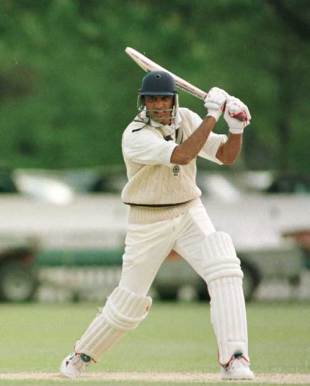
|

'Unhurried, wristy, impossibly careless, intoxicating grace' © Getty Images
|
|
He is considered a cheat, a seller of his soul and his team. Was an Armani-suited sourpuss who let down Sachin Tendulkar when the young tyro was captain. Let his filmstar wife run his life. Had the communication skills of a Benedictine monk. And once outdid himself in Sharjah by holding a press conference during which he sat with his foot on the table, clipping his toenails.
This is my favourite cricketer! Perhaps some explanation is due.
Much of what is said about Mohammad Azharuddin is true and a lot is not. But where myth met reality was hard to say, for he was hardly willing, or able it seemed, to bare his soul. For a so-called "simple" fellow, a defining term in his young days, he would become the most complex of cricketing creatures.
As a young apprentice, it is said, he was reticent, private, locked in a cocoon of shyness, fumbling across a big stage. Only with a bat was he articulate, but even there he was not so much given to prose as to poetry. His beginning was all fairytale: the unknown young Hyderabadi, slim and tall and all whippy strokes, dancing to three centuries in his first three Tests, capturing a national imagination, and unwittingly thrusting himself into a world he comprehended little.
A life in Indian cricket is much harder to negotiate than we think. "Small-town boy comes good" makes for a great story, but an arduous journey. Boys from nowhere are suddenly front-page news, invited to a baffling celebrity world, being asked to perform not just on the field but everywhere, every day, and this transition from riding cycles to practice to being owner of a chauffeured Mercedes, all done in the public eye, all so terribly fast, is seductive and scary.
There is no one in officialdom to help, no one to show the way or explain this new world; it is stand or fall. India should have learned from Azhar's mistakes, from Vinod Kambli's, but still, even now, players are left to their own devices.
Family is vital. Friends who are there not merely to massage the ego but brave enough to point out flaws are valuable. What Azhar's experience was, is hard to say, but perhaps in his later years he lacked direction, for he lost, or seemed to lose, his way. Why, we didn't, and do not, know.
Terse, often rude (yet ironically admired by teams from other shores, for mostly he was a gentleman on the field), scuffling with photographers, his divorce on the front page ("Cricketer leaves wife for actress," as if this was some unholy sin), he became easy to dislike and we took, most of us, that easy way. In his later years, he did not fit the story we wanted him to be. Barring Harsha Bhogle's book on him, there is scarcely a piece that revealed him to us.
For me, it made him as much repelling as compelling, frustrating but fascinating, this artless yet artful man of silken strokes and stony face. Later, Bhogle would tell stories of how Azhar would slip a personal cheque to players during benefit matches, and it made you rethink, wonder that perhaps there were elements to this clumsy, confounding man that we did not know, or care to.
Much of what is said about Mohammad Azharuddin is true and a lot is not. But where myth met reality was hard to say, for he was hardly willing, or able it seemed, to bare his soul
He was my favourite because no sportsman ever made me struggle so much, no Indian athlete demanded so much inner debate, no cricketer so confused the senses. As a writer you'd compose a paragraph, delete it, try again, delete, unable to suitably capture his character, explain his motivations.
We had a fair idea about Tendulkar, we could explain the once inscrutable Javagal Srinath, we could even comprehend the complex Sourav Ganguly, but Azhar defied glib definition. He challenged the imagination, he forced us to confront our biases (few liked him later on, so criticism was rarely questioned), he tested our intuitiveness, he tried our capabilities as journalists, he made us, all flawed men ourselves, understand the nature of compassion and imperfection.
He was my favourite also because he played like from a boy's dream, with an unhurried, wristy, impossibly careless, intoxicating grace (well, when the bowling wasn't quick and short), his bat a blade and he a fencer of arcs and angles and cuts and thrusts, not so much tearing apart attacks as slicing them open, standing there as upright and elegant and arrogant as a bullfighter, and even when, incomprehensibly, he whimsically wanted to score off each shot, turning into some passing whirlwind of shot-making, his play could never be called violent, as if such a word was too commonplace to attach itself to such a cultured cricketer. In short, he made you write sentences like this, one collective, bewildered exhale. He was not so much great as he was beautiful.
My last long interview with him was when he'd helped take India past Mark Taylor's Australians in 1998. In Bangalore, in his hotel room, the incongruity of the man was once again evident. The prayer mat next to the designer suits; the six pairs of designer sunglasses next to the amulet. The small-town boy who was never allowed to watch films, now married to an actress; the private man caught in the most public of careers. If it was confusing for us, imagine what it was for him.
There is no excuse for him, there cannot be; and he carries alone the responsibility for his sins. But even now, in his disgrace, he returns like an old, familiar ghost to haunt me. A man who did himself no justice. And in some strange way, perhaps, possibly, neither did we.
